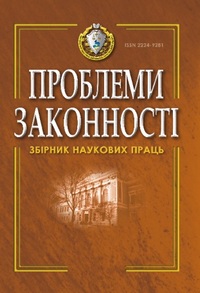Проблеми безпосереднього дослідження судом результатів невербальних та змішаних слідчих (розшукових) дій
Problems of direct study of the results of nonverbal and mixed investigative (detective) actions by the court
Author(s): O. V. KaplinaSubject(s): Law, Constitution, Jurisprudence
Published by: Національний юридичний університет імені Ярослава Мудрого
Keywords: pre-trial investigation; investigative actions; interrogation; testimony; evidence; assessment of evidence;
Summary/Abstract: According to the criminal procedure legislation, the sources of evidence in criminal proceedings are testimony, material evidence, documents and expert advice. The most common source is testimony, which, according to the legislation, can be obtained only during the interrogation. However, in law enforcement practice there are cases when during some investigative actions, other than interrogation, for instance investigative experiment, inspection, search, the investigator receives from persons involved in it certain information relevant to the criminal proceedings. However, courts sometimes consider the results of such investigative actions inadmissible as evidence, because during their conduct the investigator has recorded testimony which does not meet the requirements of the legislation regarding the procedural form of their obtaining. Such situations lead to the fact that the mentioned information is not evaluated by the courts during the trial, persons, who provided these knowledge during conducting such investigative actions are not interrogated as witnesses, and the proper judicial assessment is not made of the circumstances of the criminal proceedings which were recorded in the protocol of the investigative action. Thus, in the article the author draws attention to the awareness of the essence of the testimony as the sources of evidence in criminal proceedings; considers problems which arise during the classification of investigative actions depending on the methods of obtaining the information on verbal, nonverbal and mixed; analyzes national law enforcement practice, case-law of the European Court of Human Rights, doctrinal approaches and on the basis of the conducted research concludes that the criminal procedural legislation contains legal uncertainty regarding the concept of testimony and knowledge obtained in criminal proceedings. Author admits that the testimony of individuals should be considered in a broad sense, as it is done in the legislation of the foreign countries and in the case-law of the European Court of Human Rights, as any knowledge which has been provided by a person during investigative (detective) actions, which determined the necessity of essential guarantees to people providing it, as well as mandatory interrogation of such people in court in order to perceive the provided knowledge during the hearing and observance of the law to substantiate the court’s conclusions in judicial decision with such testimony.
Journal: Проблеми законності
- Issue Year: 2020
- Issue No: 151
- Page Range: 101-119
- Page Count: 19
- Language: Ukrainian

